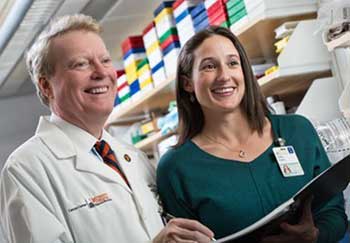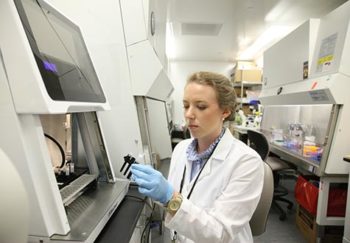
Large granular lymphocyte (LGL) leukemia is a rare cancer that affects your white blood cells; fewer than 1,000 people each year are diagnosed with LGL leukemia. What these hundreds of people experience, however, is not the same for the thousands diagnosed with other forms of leukemia. LGL leukemia prognosis and treatments may take you down an unexpected medical path.
Thomas Loughran, MD, the director of the UVA Cancer Center, first discovered the disease in the 1980s during his fellowship training. He noticed that one of his patients had larger-than-normal white blood cells. These cells behaved differently than in other known diseases, signaling a disease that hadn’t been discovered yet. Since then, he has dedicated his career to caring for patients with this disease. Dealing with a rare disease is unsettling, but the more you know about your condition in general, the better you can fight it.
What’s Going on in Your Body
In your blood, you have red blood cells, white blood cells, and platelets. Some of those white blood cells are called large granular lymphocytes. Normally, those large cells account for about 10 to 15 percent of the total white blood cells. In a person with LGL leukemia, the percentage of large granular lymphocytes is much higher. These cells copy themselves and attack your bone marrow and joints.
Because the disease affects your blood cell counts, most of your symptoms are related to changes in the concentrations of red or white blood cells in your body. White blood cells are essential to your body’s ability to fight off infections. Neutrophils are a type of white blood cell. If you have LGL leukemia, you may also have neutropenia, or a low concentration of neutrophils, which makes you prone to getting bacterial infections, such as sinus infections or pneumonia. Anemia, or a low concentration of red blood cells, is also common in people with LGL leukemia. This causes tiredness, fatigue and shortness of breath. The platelet count is not usually affected in patients with LGL leukemia.
LGL Symptoms
Other symptoms include:
- Repeated infections
- Frequent fevers
- Night sweats
- Unintended weight loss
- Weakness
- Enlarged spleen
The symptoms vary widely, however, and you may not experience any symptoms. You want to do your best to avoid infections, be extra diligent during cold and flu season and always bring up any health or contamination concerns to your doctor.
LGL Leukemia Prognosis: Chronic
Unlike other forms of leukemia, which are due to rapidly proliferating immature cells and considered acute, LGL leukemia is a chronic disease of mature cells. Thus, LGL leukemia prognosis is different than other types of cancer. It progresses slowly and needs consistent management — similar to an autoimmune disease. (In acute forms of leukemia, the disease progresses faster, requiring an intense period of treatment. After that, it may go into remission.)
In some LGL leukemia cases, you may not even need treatment. Most often, treatment is only needed when you have anemia or neutropenia. If you have no symptoms, your doctor may suggest diet and exercise, which help handle side effects and boost your body’s ability to fight off illness. When treatment is needed, immunosuppressants like methotrexate are the most commonly prescribed option.
There’s no cure for the disease, but because it isn’t aggressive in the vast majority of cases, many people live long lives with LGL leukemia. Living with the disease means getting blood work done every four to six months and doing your best to stay well. Eat healthy, exercise regularly and, again, try to avoid infections. Dealing with a chronic condition, while not always life-threatening, can be a strain on your well-being, so make sure to keep up on your mental health and seek out counseling to help you with your unique situation.
How It’s Connected to Autoimmune Diseases
If you have LGL leukemia, there’s a good chance you also have an autoimmune disease, the most common being classic rheumatoid arthritis. The symptoms of your disease, such as repeated infections, may also overlap with an autoimmune disorder. (This is why your doctor is your greatest ally in your treatment.) One key feature of LGL leukemia, however, is your abnormal blood cells are clonal, meaning they replicate themselves. This cellular copying is what defines this disease as cancer and not an autoimmune disorder, and because the cells are in the blood, it’s a form of leukemia.
Learn More About Your LGL Leukemia Prognosis
We have several articles and resources to help you understand LGL leukemia.
LGL leukemia is often managed with medications that suppress your body’s immune response, much like autoimmune disorders such as rheumatoid arthritis. Researchers are investigating the link between the two conditions and why they seem to overlap in this disease. It’s unclear yet whether the leukemia or the autoimmune disease comes first. Autoimmune disorders may also appear in the family history of a person with LGL leukemia, suggesting a relationship between the two conditions.
If you or a loved one have been recently diagnosed with LGL leukemia, look for a physician with experience in the disease and reach out to others who are going through the same experience. Online support groups can help connect you to others going through treatment for this rare disease. (You can learn more about the blood smear you’ll experience during your initial visits here, as well the flow cytometry and the T-cell receptor (TCR) rearrangement diagnostic tests that may follow.)
The LGL Leukemia Program at the UVA Cancer Center is a national leader in providing care and research for the disease. When you ask what is LGL leukemia, you can rest assured our doctors and nurses have a detailed answer for you. We offer the latest clinical trials and evidence-based treatment options, so talk to your doctor about any questions or concerns you may have about you or your loved one’s diagnosis.


I just visited Dr. Loughran and his Clinical assistant. Both are wonderful caring people who are passionate about helping those diagnosed with LGL understand in layman’s terms exactly was this disease us and does. By all means, if you can schedule a visit with his team and become a part of the LGL blood registry.
My name is Roy Teeters I live in charlotte Nc. I have lgl I’ve had it for about 7 years and I’m on treatment for it and of course I got RA but my question is , is it deadly and I get infections off and on but what’s the best way to prevent those infections because I’m not taking any antibiotics. Is some kind of home remedy that can help. Thank you have a great day.
Roy, we’re sorry, but we can’t give specific medical advice through this blog. You might find our LGL FAQs helpful. You’re also welcome to schedule an appointment with our LGL program by calling 434.924.9333.
I am a Nurse(RN)in San Diego….I am interested in learning more information pursuant T-cell LGL Leukemia for personal knowledge. Thank You.
I was diagnosed with LGL Leukemia on 12/15/21 , I a struggling with it mentally, I’m so angry! 😠 please pray for me 🙏 , I would appreciate everyone’s prayers🙏 !I Will also keep each and everyone of you in my prayers as well! I thank you all in advance!